|
|
|
Sort Order |
|
|
|
Items / Page
|
|
|
|
|
|
|
| Srl | Item |
| 1 |
ID:
162766
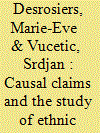

|
|
|
|
|
| Summary/Abstract |
What does causation mean in conflict studies? Using a sample of published qualitative, article-length studies on the Rwandan and Yugoslav wars, this article finds a lack of reflexivity over causal claims in scholarship on conflict. Causal language is not as pervasive as expected, asserted cause-effect relationships are rarely fully explicated, and scholars under-explore their causal assumptions. Considering that ideas on causation necessarily condition explanations of conflict, including “ethnic” conflict, this is a major research issue. While there exists a lively debate between different causal narratives regarding the onset of conflict—with studies alternatively stressing “attitudes,” “conditions,” or both—it stops short of addressing issues at the deeper level of causal understandings. For the most part, studies subscribe to the search for empirical generalization, thus limiting attendant debates to a single model of causation. These findings indicate that conflict studies literature would benefit from greater reflexivity and pluralism with regards to causation and paying more attention to philosophical debates on the subject. The article provides a basic outline of this reflexive agenda.
|
|
|
|
|
|
|
|
|
|
|
|
|
|
|
|
| 2 |
ID:
105931
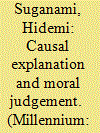

|
|
|
|
|
| Publication |
2011.
|
| Summary/Abstract |
By combining arguments about causal explanation in history found in the writings of Veyne and Dray, this article discusses one plausible line of reasoning which suggests that there is a type of causal explanation which historians offer to which their moral judgements are conceptually integral. It assesses the validity of this line of thinking and suggests that the reason why, in some cases, our moral judgements seep through to our causal explanations is not that certain concepts, such as, in particular, passivity and activity of the key actors' acts, used in our causal narratives, necessarily involve moral judgements for their application, but rather that any explanation is an answer to a question and some causal questions turn out to be, or may plausibly be construed as, asking for our moral views. The 'intrusion' of moral judgement into causal explanation is not logically necessary, but may be contextually appropriate in some cases.
|
|
|
|
|
|
|
|
|
|
|
|
|
|
|
|
| 3 |
ID:
123590
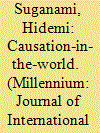

|
|
|
|
|
| Publication |
2013.
|
| Summary/Abstract |
This article examines critical realists' key contention that 'causing', or the operation of causal powers, is real or mind-independent. Against their opponents (causal idealists), they point out the (seeming) empirical obviousness of the mind-independence of causal powers, causal idealism's lack of 'ontological grounding', its 'epistemic fallacy' and so on. The validity or force of such arguments is ultimately dubious, however. Still, the understanding that causal powers are real is a necessary presupposition of scientific knowledge production and application and of our everyday thinking and practice; realists and idealists can converge on this point. Moreover, there is nothing in causal idealism as such that is incompatible with critical realists' key insight that causal laws should be understood as stating the ways things work, producing observable regularities only in closed systems and that regularities are not an intrinsic feature of causal relations. I conclude by exploring the implications of this line of thinking for the study of world politics, endorsing a move from a search for parsimonious theories that explain regular patterns observable in the international system towards a historical study of global social relations, which pays attention to causal complexes, diversity of historical contexts and the contested nature of causal interpretations.
|
|
|
|
|
|
|
|
|
|
|
|
|
|
|
|
| 4 |
ID:
150500
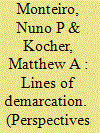

|
|
|
|
|
| Summary/Abstract |
Qualitative historical knowledge is essential for validating natural experiments. Specifically, the validity of a natural experiment depends on the historical processes of treatment assignment and administration, including broader macro-historical dynamics. But if validating a natural experiment requires trust in the ability of qualitative evidence to establish the causal processes through which the data were generated, there is no good reason for natural experiments to be considered epistemically superior to historical research. To the contrary, the epistemic status of natural experiments is on a par with that of the historical research on which their validation depends. They are two modes of social-scientific explanation, each with its own pros and cons; neither is privileged. We illustrate this argument by re-examining an important recent contribution to the literature on violent conflict: Ferwerda and Miller’s 2014 natural experiment estimating the causal effect of the German decision to devolve authority to the Vichy French government on violent resistance during World War II.
|
|
|
|
|
|
|
|
|
|
|
|
|
|
|
|
| 5 |
ID:
065708
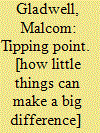

|
|
|
|
|
| Publication |
London, Abacus, 2000.
|
| Description |
viii, 279p.
|
|
|
|
|
|
|
|
|
|
|
|
Copies: C:1/I:0,R:0,Q:0
Circulation
| Accession# | Call# | Current Location | Status | Policy | Location |
| 050138 | 302/GLA 050138 | Main | On Shelf | General | |
|
|
|
|
| 6 |
ID:
139420
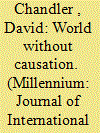

|
|
|
|
|
| Summary/Abstract |
Advocates of Big Data assert that we are in the midst of an epistemological revolution, promising the displacement of the modernist methodological hegemony of causal analysis and theory generation. It is alleged that the growing ‘deluge’ of digitally generated data, and the development of computational algorithms to analyse them, has enabled new inductive ways of accessing everyday relational interactions through their ‘datafication’. This article critically engages with these discourses of Big Data and complexity, particularly as they operate in the discipline of International Relations, where it is alleged that Big Data approaches have the potential for developing self-governing societal capacities for resilience and adaptation through the real-time reflexive awareness and management of risks and problems as they arise. The epistemological and ontological assumptions underpinning Big Data are then analysed to suggest that critical and posthumanist approaches have come of age through these discourses, enabling process-based and relational understandings to be translated into policy and governance practices. The article thus raises some questions for the development of critical approaches to new posthuman forms of governance and knowledge production.
|
|
|
|
|
|
|
|
|
|
|
|
|
|
|
|
|
|
|
|
|